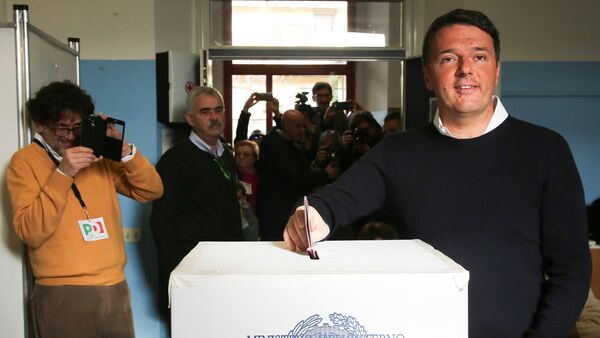The constitutional reform would be the largest since the Italian Republic was formed following a referendum in 1946, and is comprised of several planks.
Firstly, Renzi wants to reduce the power of the Senate, Italy's upper house of parliament, which currently enjoys the same power to change and approve legislation as the lower house. As a result, legislation has to be approved by both houses of parliament in the same form, which makes it difficult for the government to receive majority backing for legislative projects.
Under Renzi's plan the number of senators would be reduced from 315 to 100, they would represent Italian regions and take on a consultative role, instead of mirroring the powers of the 630 deputies of Italy's lower house. Senators would also be deprived of the right to pass a vote of no confidence in the government.
Renzi also proposes to reform Italy's provincial governments. Provinces will be removed from the constitution and since senators will represent the Italian regions, they could be abolished altogether.
The Prime Minister wants to abolish the National Council for Economics and Labor (CNEL), an assembly of experts who advise the Italian government, Parliament and the regions, a step which he says will save €20 million.
Another part of the reform package concerns petitions. Current Italian law states that 50,000 petitions are required in order to propose legislation, but the Italian parliament is not obliged to discuss the proposal. Renzi's reform pledges that parliament has to consider any petition which gets more than 150,000 votes.

Ettore Greco, director of the Istituto Affari Internazionali (IAI) in Rome told Gazeta.ru that Renzi is hoping for victory that will give him momentum to carry out further reforms.
"Premier Renzi is hoping that the impulse which he receives if voters say 'yes' in the referendum will give him the possibility to renew reform, the implementation of which has slowed significantly in recent years."
"A large part of the electorate doesn't see an alternative to Renzi's plans, because of fears that his defeat in the referendum could cause a long period of political instability, not least because the opposition is weak and fragmented," Greco said.
Opponents to the reform argue that it reduces crucial checks and balances in Italy's political system. The anti-establishment Five Star Movement, which has called for a referendum on the Euro single currency, has become the largest opposition party in Italy.
Five Star Movement leader Beppe Grillo has called on followers to oppose the reform, and if Renzi loses it is likely that Italy will hold a general election next summer, in which a Five Star victory is a real possibility.
According to a poll conducted November 17 by Lorien, the Five Star Movement has even more popular support than Renzi's center-left Democratic Party.

Opinion polling is banned in Italy for two days before an election, but recent polls have shown that many Italians remained undecided.
According to a poll of 1,000 respondents conducted by the Agora-RAI3 television program on November 16, 62 percent of Italians are planning to vote in the referendum, 27 percent aren't taking part and 11 percent still hadn't decided.
Of those who intend to vote, 37 percent said they were voting in favor of the reform, and 42 percent said they were voting against.
A poll carried out for the newspaper La Repubblica November 14-16 found 41 percent reject the reform, 37 percent are in favor and 25 percent still undecided.
A poll by Corriere della Sera over the same period found 45 percent against the reform, and 55 percent reject it.
Renzi himself has promised to leave office if he doesn't get the vote he wants, calling the reform a "matter of principle."
"If I lost, I'm not just going home, I'm leaving politics altogether," Renzi told Rai News.
"I am not prepared to turn the referendum into a plebiscite about faith (in my government), but for me this is a matter of principle."




